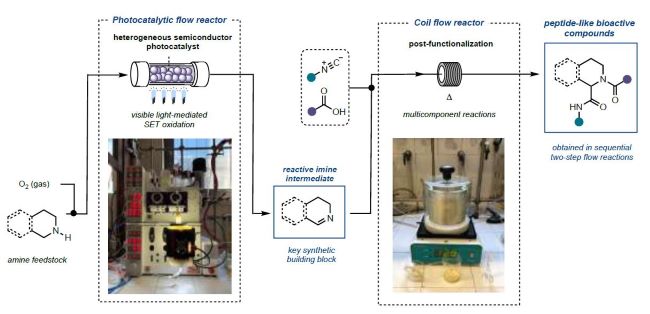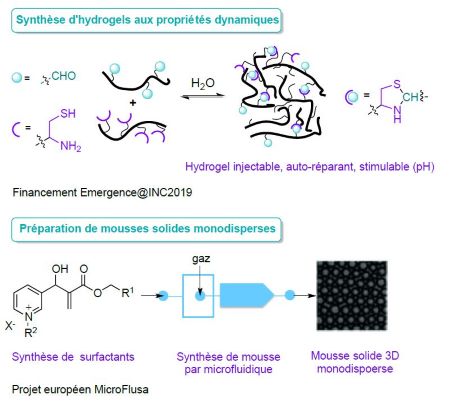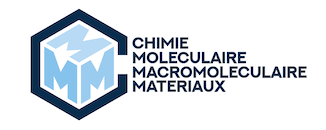Chimie Moléculaire et Catalyse (CMC) team
The research activity of the Molecular Chemistry and Catalysis (MCC) team focuses on the development of innovative synthetic tools for the (stereo)selective synthesis of molecules of potential interest in medicinal chemistry, agrochemistry and materials chemistry. This work is organized around two main themes: the reactivity of constrained cycles and sustainable chemistry. Several multidisciplinary projects in materials science and microfluidics are also described.
Theme 1. Reactivity of constrained cycles
One of the CMC team’s key themes is the development of selective synthesis methods for accessing molecules with original structures that make them of interest for applications. To this end, a major line of research involves exploiting the reactivity of constrained rings in various transformations to generate a diversity of carbo- and heterocycles. This work, carried out in part in collaboration with industrial partners (Seqens, Diverchim), has in particular enabled us to gain access to nitrogenous heterocycles or polysubstituted cyclopropanes, which are preferred structures in medicinal chemistry.

The synthesis of variously substituted carbo- and constrained heterocycles (three- or four-membered) by catalytic asymmetric hydrogen transfer is also targeted, and this work has notably been the subject of ANR funding (PRC 2022-2025, in collaboration with ChimieParisTech-PSL).

Theme 2. Development of synthetic tools for sustainable chemistry
(Photo)catalysis using abundant metals
The development of eco-compatible processes is a major concern for the CMC team. To this end, (photo)catalysis (metal, organocatalysis) is at the heart of numerous research projects. In particular, naturally abundant metals (Fe, Co, Cu) have been used to form C-C bonds in coupling reactions or rearrangements, in order to offer an alternative to the intensive use of precious metals whose future resource is compromised. This approach is now being extended to the study of photocatalyzed transformations involving iron complexes (ANR JC/JC ICAR, 2022-2025).

Continuous flow chemistry, heterogeneous (photo)catalysis
Benjamin Laroche, lecturer recruited to the unit in 2020, has driven new research themes centered on continuous flow chemistry, heterogeneous catalysis, photochemistry and supported photocatalysis.

This activity has been supported by several grants (AAP Carnot 2021 and 2022, Sanofi Itech Awards 2022) and several collaborative projects involving the ParisFLOWTech platform (PSL) and industrial partners have been carried out.

Theme 3. Multidisciplinary projects
The team is also involved in collaborative multidisciplinary projects. In particular, a project funded by a European contract (MicroFlusa) dedicated to the preparation of foams with micrometer-sized pores has been carried out. The synthesis of new surfactants, combined with the use of microfluidic tools, has enabled the production of monodisperse 3D solid foams.
Projects involving the synthesis, characterization and application of macromolecules with innovative properties were also carried out. In particular, joint work with the "Chemistry and Macromolecular Design (CDM)" team aims to identify and study reversible covalent reactions that can be transposed into polymeric matrices to obtain materials with dynamic properties. By way of example, a self-repairing, injectable hydrogel was obtained by exploiting an original exchange reaction. A collaboration with Saint-Gobain has also been initiated to synthesize dynamic silylated polymers for construction materials. The creation of the C3M unit has enabled the CMC team to broaden its field of expertise, while preserving its specific activities in molecular chemistry and catalysis.


